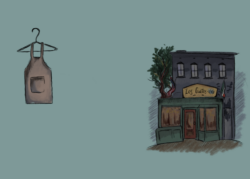In the past few months, the anonymous social media application Yik Yak raised questions about students’ use of public forum on college campuses across the United States. Several universities have taken steps to ban the application due to concerns about cyber bullying and threats posted by users.
Utica College and Norwich University blocked Yik Yak from their campus Wi-Fi in response to offensive comments posted on their campuses’ feeds. Yik Yak’s Lead Community Developer Cam Mullen said that although some schools have responded negatively to Yik Yak, several university administrations at schools such as Cornell University have tried to learn more about the application or use it to their advantage by posting messages such as good luck wishes to students before exams.
“There have been some negative responses, [because Yik Yak] is a really powerful tool and when an entire student body is adopting it—hundreds of thousands of students within days—it can startle administrations,” Mullen said. “But what we’ve seen [it] as … administrations have learned more about it they’ve kind of learned to embrace it and have begun moving to the other side of the spectrum and saying ‘our students are on this, how can we use it responsibly and how can we learn from it, [to] enrich the lives of our students.’”
Yik Yak Campus Representative Zakiya Jamal (COL ’15) said that she has not noticed many negative posts on Georgetown’s feed. As part of her job as a Campus Representative, she is responsible for reporting posts that may be considered offensive. Because there are many tools to filter posts, Jamal believes that universities blocking the application from campus Wi-Fi is an infringement on free speech.
“Blocking Yik Yak seems like an infringement on our rights to use our personal [electronic devices] and that goes outside the realm of a university,” Jamal said. “They shouldn’t have the right to tell us what applications we can or can not use. Other representatives and I have talked to Yik Yak about working with universities to make sure that what’s being posted isn’t offensive or disrespectful. As far as how the application is being used—that’s really the creators’ realm and it’s not the university’s place to try and control it.”
Despite the perceived lack of negative posts on Georgetown’s Yik Yak feed, Josh Tobin (COL ’18) still feels that the application still has a negative effect on Georgetown students by allowing users to hide behind their anonymous status.
“The Internet in general has given people a sense of anonymity because it allows us to sit at a computer and say whatever we want without having to face the consequences or see the other person’s reaction,” Tobin said. “Yik Yak only further emphasizes that by actually making it completely anonymous. People can say anything and not face any repercussions.”
Although the application has received some criticism for allowing users to shield their identities, Mullen said that Yik Yak was created as an anonymous application in order to remove social barriers that would typically discourage some users from posting. The anonymity allows users’ posts to be judged solely on content, rather than on who is saying it.
“The combination of [keeping your privacy and anonymity] leads to really good content because you’re able to say things that you wouldn’t share on other networks and you’re connected to everyone,” Mullen said. “When Yik Yak came out, [people were] able to share these intimate or personal thoughts with their community and see what they think. … A Yak has just a good a chance if the captain of the football team says it or if a quiet girl in the back of a classroom says it.”
According to Mullen, Yik Yak is intended for a college audience and has several tools to monitor who is using it and what they are posting. These include geofencing around middle and high schools, a download age limit and filters which look for words that are linked to threats or bullying. However, Mullen said that one of the most powerful ways to monitor inappropriate posts is in the hands of users themselves.
“One of the strongest moderation tools is actually in the community’s hands,” Mullen said. “People can upvote posts and downvote posts and once [a post] gets to a score of minus five, it’s taken off the feed, and that gets content off pretty quickly. As our communities get more diverse, and become better at regulating and upvoting the good and downvoting the bad, the better the content that comes on Yik Yak.”
According to Mullen, the application was designed to create a sense of community on college campuses.
“It’s kind of perfect because on college campuses there’s a huge portion of people that are living on campus within two miles of each other, which is pretty much the basic radius that Yik Yak creates,” Mullen said. “They’re all going through similar experiences, and the same school spirit, the same inside jokes, the same exam schedules, so if you look at Yik Yak on one of these campuses, like Georgetown, [everyone identifies with the content].”
Mullen hopes that in the future, every college student will have the same positive experience with Yik Yak that he has.
“I’d love to see every single student at every single college using it to communicate with the whole community,” Mullen said. “Whenever I go to a new place I open up Yik Yak and can get a pulse of what’s going on in the area. It’s awesome because I learn so much about the place I am through Yik Yak.”




